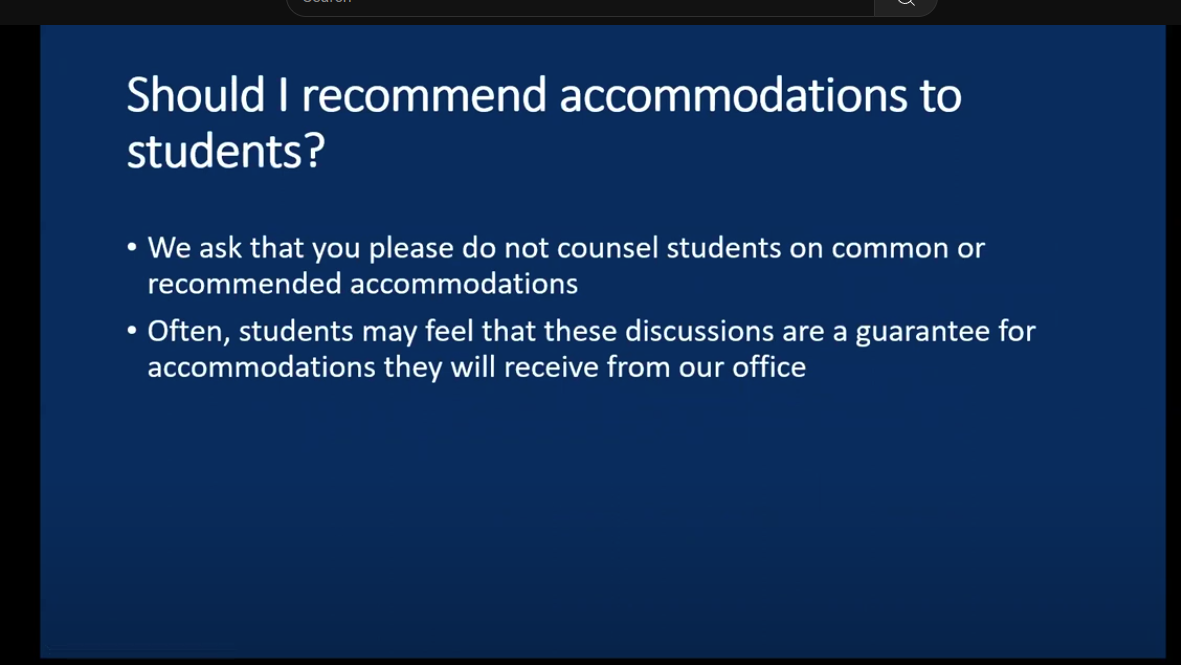
Providing accommodations in the classroom is a collaborative process between the student, faculty and Disability Resources (DR). Please contact us if you have any questions or need assistance in providing an accommodation
The goal of accommodations is to minimize the impact of the disability, allowing the student to gain equal access.
An accommodation should not require a substantial change or alteration in the curriculum or to any essential element of the course.
All students should be required to meet the same course objectives.
If a student is requesting accommodations but does not have a letter from DR please refer them to our office.
Unless you are advised otherwise accommodations are not retroactive and will apply only after you receive a letter from DR.
Read the Faculty FAQ’s on our ADA Coordinator's web page.
As a faculty member who has a student with a documented disability in class, you may choose to administer your exam with all the approved accommodations or you may take advantage of the Disability Resources (DR) testing area. With few exceptions, students testing in DR will be electronically monitored and all can be recorded at your request.
Should you choose to have your student complete his/her exam(s) in the DR office, please read the following:
Submitting Exams
Exams can be submitted electronically by completing the electronic test submission form
OR
Exams may be delivered in person with a testing instructions form included for each student. Additional forms are available in the DR office or online
Please deliver or submit exams to the DR office no later than 4pm the day before testing. As a courtesy you may receive a reminder email prior to this time.
The DR office will have scantrons, basic calculators and scratch paper available for electronically submitted exams. If you deliver the exams in person we would appreciate having the needed materials included with the exams.
We recommend professors pick up completed exams, but if you wish, exams may be sent by campus mail. Please note, campus mail picks up from our office around 10am and 2pm each day. Exams completed after 2pm will not be picked up until the next work day.
Final exams – Students with more than one exam in a day may need to adjust their exam start times so that they are able to receive all of their extended time on each exam.
Thank you for your assistance! We look forward to our continued, successful work together, and please do not hesitate to contact us if you have any questions or concerns, 812-464-1961.
Creating an environment that will allow all potential students to have access to materials. It is much more efficient to create an accessible course at the beginning than to go back and fix problems later.
Make sure everything is accessible for screen reading software
Most individuals that are blind will use screen reading software such as JAWS. If you are using MS office products or other mainstream products they should be accessible to screen readers. If you are using any special software please contact Disability Resources to check for accessibility before using.
Use page formatting that is standard and consistent.
Make sure Hyperlink names clearly indicate what it is linking to
Use built-in formatting styles and always use them to create headers
Avoid Prezi presentations – they cannot be read with a screen reader
Use easily recognizable fonts without serifs such as Arial, Verdana, Calibri (Students should have software to enlarge the font as needed).
Be sure there is good contrast between print and background.
Make sure all pages are uncluttered.
Do not use color as the only means to convey meaning ( i.e. red arrows show how to get to point A and blue arrows show point B. Instead add distinguishing features to the arrows such as dotted or dashed lines. )
Uncluttered pages
Consistent formatting
Uncluttered pages
Consistent formatting
Synchronous communication may be difficult
Be sure all videos have accurate captions.
Skype, live chats and telephone conversations should be avoided.
If Voicethread is used all students will need to add captions with their comments http://docs.voicethread.com/web-application/accessibility-web-application/closed-captioning/
Make sure that all required actions can be done with a keyboard. This includes playing videos.
Synchronous communication may be difficult
For Hybrid classes be sure all in person meetings have a fully accessible meeting place.
Skype, live chats and telephone conversations should be avoided.
Avoid attention grabbing flickers
Avoid Prezi presentations
Teach students discussion board etiquette.
If it's auditory make it visual also; if it's visual make it auditory also, giving a variety of ways for students to access the materials.
Consider mock exams to allow students to become comfortable with the format and to test any assistive technology they may be using and also to make sure they can receive extra time as approved.
Use Asynchronous communication including message, discussion boards and email.